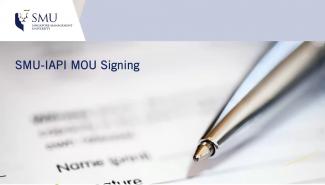
With the rapid pace of development in the world today, accelerated by the COVID-19 pandemic, there is an urgency for companies to evolve, and for professionals to keep up with global advancements and digital transformation. As with all jobs, it is critical for accountants and finance professionals to future-proof themselves through upskilling to embrace the new normal. In order to thrive, it is also important for organisations to build meaning partnerships with industry and business associations.
A Memorandum of Understanding (MOU) was signed on 12 August 2021 between Singapore Management University (SMU) and Institut Akuntan Publik Indonesia (IAPI), which allows the mutual exchange of resources, global partners, and solutions between both organisations. With the partnership, SMU and IAPI (also known as the Indonesia Institute of Certified Public Accountants) aim to collaborate on professional development programmes, explore placement and post-graduate opportunities, and work jointly on research and strategic projects.
The virtual MOU-signing ceremony was attended by more than 100 people from SMU and IAPI. In his opening remarks, SMU’s Senior Vice President, Administration, Mr Hugh Edmiston said “In line with our internationalisation agenda, SMU seeks to broaden and deepen its engagement in research, education and cross-border collaborations, particularly in South East Asia. We would also like to see more of our students and faculty exposed to the business and cultural operating environments, so they can gain industry experience and be able to integrate with other societies. We are happy that the MOU between SMU and IAPI recognises the potential for collaboration in the areas of practical training, study missions, internships and employment placements.”
In his opening address, Pak Tarkosuranyo, President of IAPI expressed his gratitude for the support and cooperation provided by all members of SMU and IAPI who made the partnership possible, and stressed the importance of sustainability report accounting in the era of globalisation. “Companies must prioritise not only profit but also the environment’s eco-system”, he said.
The MOU was signed by Mr Hugh Edmiston and Pak Irhoan Tanudiredja, Head of International Relations, IAPI. It was followed by a video presentation of the SMU-IAPI Learning Journey, which covered details of programmes including the Business and Intangible Assets Valuation, Environment, Social and Governance (ESG) and Materiality Reporting, SMU-GoImpact Certificate in Impact Investing and Mega Trends in Sustainability, Executive Certificate in Risk Management Leadership, and post graduate opportunities at SMU. More information of the SMU-IAPI programme can be accessed here.
To mark the occasion of the MOU signing, the event also launched the first of a series of professional seminars and training programmes together with IAPI on Environmental, Social and Governance (ESG) and Materiality. The webinar was conducted by Mr Sovann Giang, Senior Director, Business Consulting at RSM Singapore. He is also the Head of Board Leadership Advisory, NPO Practice & Sustainability Reporting Practice and an Affiliate Faculty at the Singapore Management University Academy.
Entitled “Accountants’ Role in Sustainability Reporting”, the session covered the value of Sustainability Reporting and common reasons why some financial reports do not portray a company’s ESG efforts well. With their knowledge of various reporting standards, public accountants have a role in articulating their company’s ESG strategies, to show consistency with corporate objectives. If done successfully, key stakeholders can rest assured that their interests are addressed.
Mr Giang says, “Over the long term, good ESG practices give companies good strategic advantage, leading to value creation, such as brand enhancement and product differentiation. Because in the eyes of customers and stakeholders, you are a much better company compared to one that doesn’t have good sustainability practices.”


